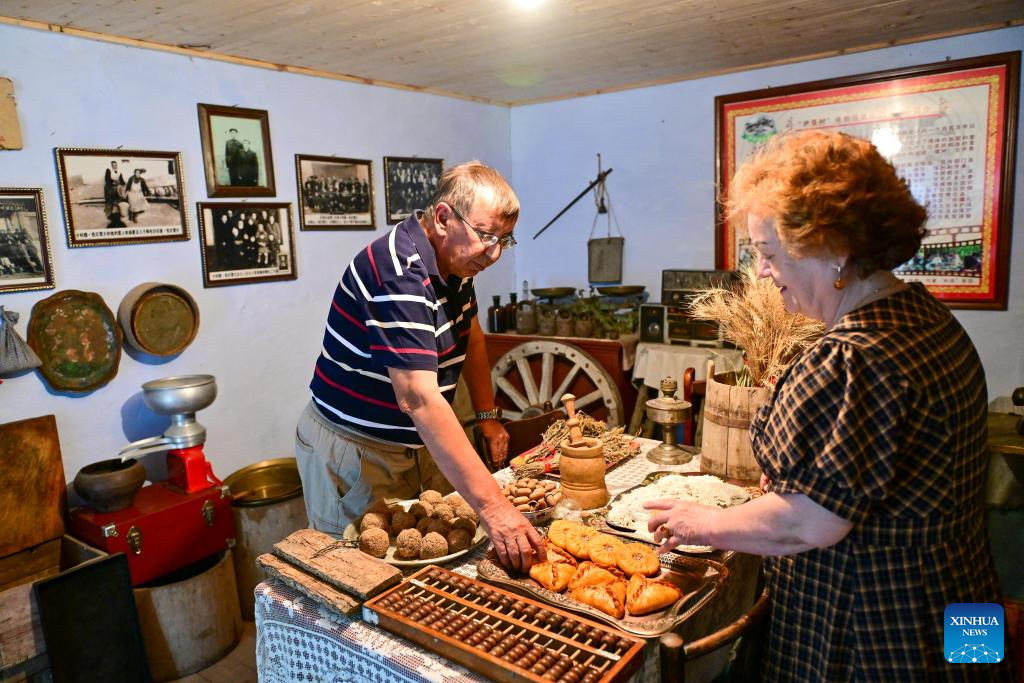
Zaitunna and her husband arrange the items at their family museum of Tatar ethnic culture in Tacheng City, northwest China's Xinjiang Uygur Autonomous Region, July 24, 2024. Zaitunna, an ethnic Tatar woman living in Tacheng City of Xinjiang, is a representative inheritor of Saban Festival of Tatar ethnic group, which is one of the national intangible cultural heritages. She is also famous in the city for her expertise in making traditional Tatar pastries.
Over the years, Zaitunna and her husband have been committed to the inheritance and promotion of Tatar ethnic culture. They used their old family house built in 1915 to establish the first family museum of Tatar ethnic culture in Tacheng City, displaying a collection of more than 500 pieces of old objects full of Tatar characteristics, which carry the life memories of the family for several generations. Today, their family museum attracts visitors from all over the country, and the Tatar pastries made by Zaitunna are also sold nationwide.
In recent years, Tacheng City has accelerated the exploitation, protection and inheritance of folk culture. The folk customs of Tacheng city have become a major feature in promoting local tourism, attracting tourists from all over the world. At present, there are 14 family museums in the city, receiving around 100,000 visitors a year. (Xinhua/Ding Lei)
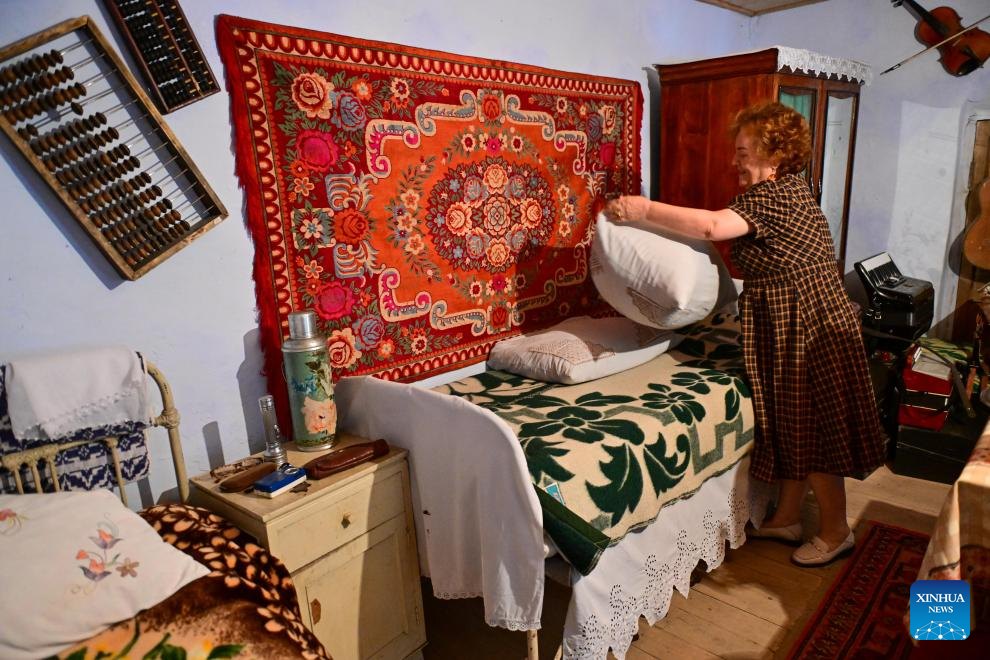
Zaitunna arranges the items at her family museum of Tatar ethnic culture in Tacheng City, northwest China's Xinjiang Uygur Autonomous Region, July 24, 2024. Zaitunna, an ethnic Tatar woman living in Tacheng City of Xinjiang, is a representative inheritor of Saban Festival of Tatar ethnic group, which is one of the national intangible cultural heritages. She is also famous in the city for her expertise in making traditional Tatar pastries.
Over the years, Zaitunna and her husband have been committed to the inheritance and promotion of Tatar ethnic culture. They used their old family house built in 1915 to establish the first family museum of Tatar ethnic culture in Tacheng City, displaying a collection of more than 500 pieces of old objects full of Tatar characteristics, which carry the life memories of the family for several generations. Today, their family museum attracts visitors from all over the country, and the Tatar pastries made by Zaitunna are also sold nationwide.
In recent years, Tacheng City has accelerated the exploitation, protection and inheritance of folk culture. The folk customs of Tacheng city have become a major feature in promoting local tourism, attracting tourists from all over the world. At present, there are 14 family museums in the city, receiving around 100,000 visitors a year. (Xinhua/Ding Lei)
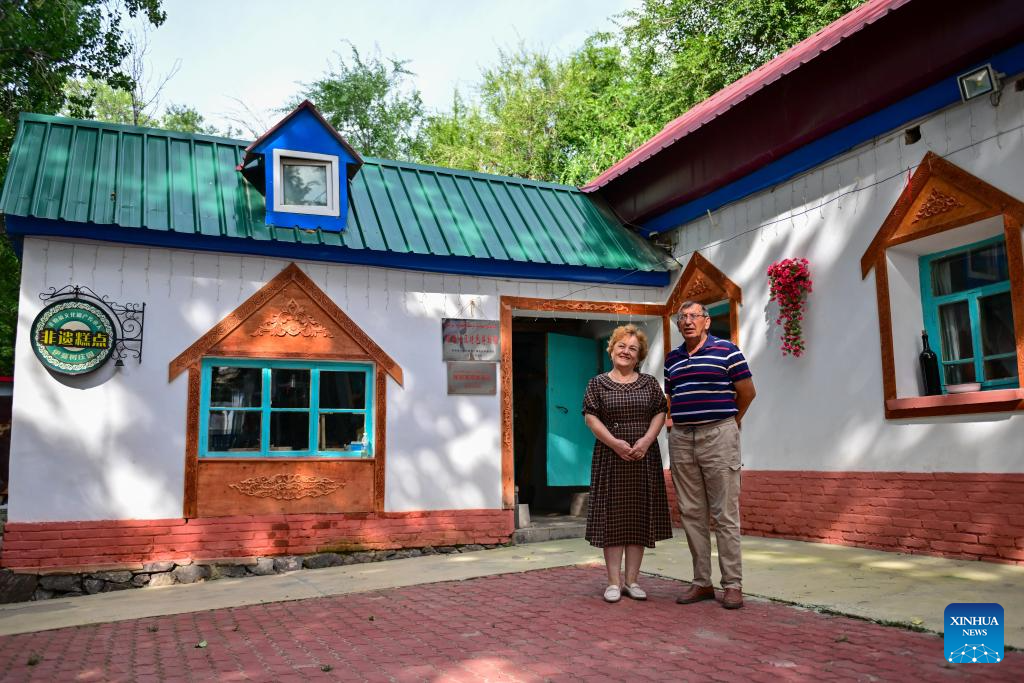
Zaitunna and her husband are pictured at their family museum of Tatar ethnic culture in Tacheng City, northwest China's Xinjiang Uygur Autonomous Region, July 24, 2024. Zaitunna, an ethnic Tatar woman living in Tacheng City of Xinjiang, is a representative inheritor of Saban Festival of Tatar ethnic group, which is one of the national intangible cultural heritages. She is also famous in the city for her expertise in making traditional Tatar pastries.
Over the years, Zaitunna and her husband have been committed to the inheritance and promotion of Tatar ethnic culture. They used their old family house built in 1915 to establish the first family museum of Tatar ethnic culture in Tacheng City, displaying a collection of more than 500 pieces of old objects full of Tatar characteristics, which carry the life memories of the family for several generations. Today, their family museum attracts visitors from all over the country, and the Tatar pastries made by Zaitunna are also sold nationwide.
In recent years, Tacheng City has accelerated the exploitation, protection and inheritance of folk culture. The folk customs of Tacheng city have become a major feature in promoting local tourism, attracting tourists from all over the world. At present, there are 14 family museums in the city, receiving around 100,000 visitors a year. (Xinhua/Ding Lei)
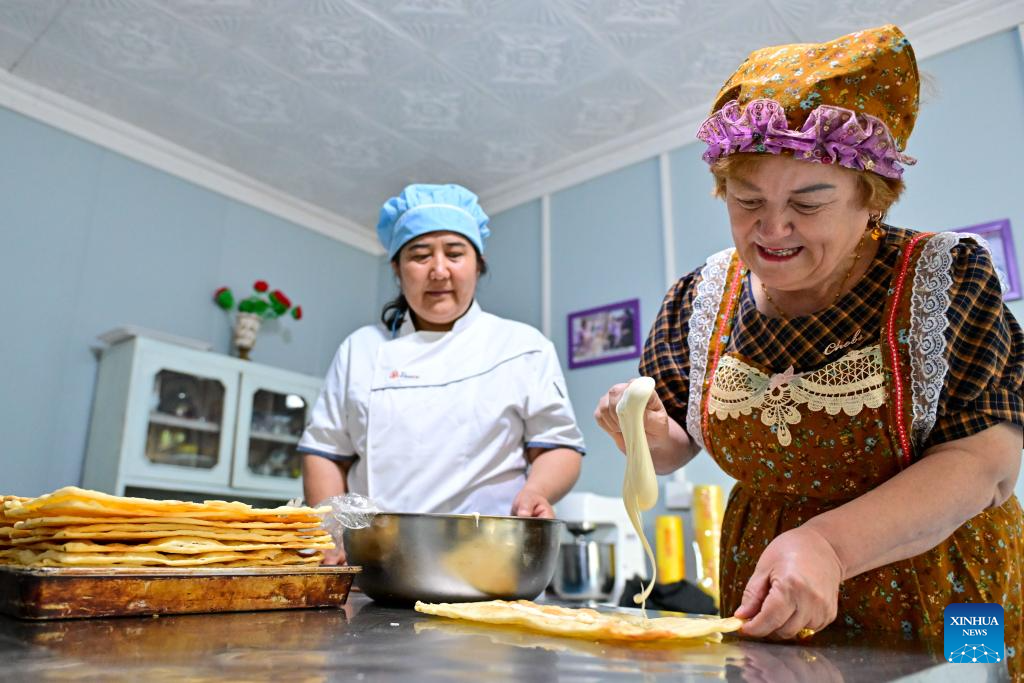
Zaitunna (R) demonstrates as her apprentice learns to make traditional Tatar pastries in Tacheng City, northwest China's Xinjiang Uygur Autonomous Region, July 24, 2024. Zaitunna, an ethnic Tatar woman living in Tacheng City of Xinjiang, is a representative inheritor of Saban Festival of Tatar ethnic group, which is one of the national intangible cultural heritages. She is also famous in the city for her expertise in making traditional Tatar pastries.
Over the years, Zaitunna and her husband have been committed to the inheritance and promotion of Tatar ethnic culture. They used their old family house built in 1915 to establish the first family museum of Tatar ethnic culture in Tacheng City, displaying a collection of more than 500 pieces of old objects full of Tatar characteristics, which carry the life memories of the family for several generations. Today, their family museum attracts visitors from all over the country, and the Tatar pastries made by Zaitunna are also sold nationwide.
In recent years, Tacheng City has accelerated the exploitation, protection and inheritance of folk culture. The folk customs of Tacheng city have become a major feature in promoting local tourism, attracting tourists from all over the world. At present, there are 14 family museums in the city, receiving around 100,000 visitors a year. (Xinhua/Ding Lei)
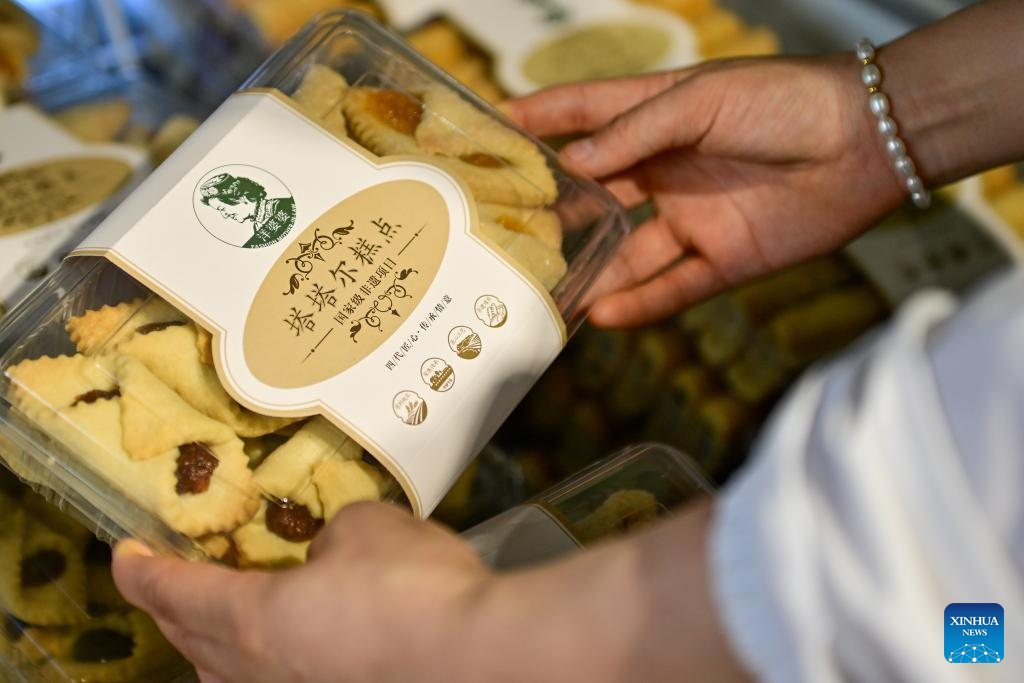
A customer selects traditional Tatar pastries at Zaitunna's retail store in Tacheng City, northwest China's Xinjiang Uygur Autonomous Region, July 24, 2024. Zaitunna, an ethnic Tatar woman living in Tacheng City of Xinjiang, is a representative inheritor of Saban Festival of Tatar ethnic group, which is one of the national intangible cultural heritages. She is also famous in the city for her expertise in making traditional Tatar pastries.
Over the years, Zaitunna and her husband have been committed to the inheritance and promotion of Tatar ethnic culture. They used their old family house built in 1915 to establish the first family museum of Tatar ethnic culture in Tacheng City, displaying a collection of more than 500 pieces of old objects full of Tatar characteristics, which carry the life memories of the family for several generations. Today, their family museum attracts visitors from all over the country, and the Tatar pastries made by Zaitunna are also sold nationwide.
In recent years, Tacheng City has accelerated the exploitation, protection and inheritance of folk culture. The folk customs of Tacheng city have become a major feature in promoting local tourism, attracting tourists from all over the world. At present, there are 14 family museums in the city, receiving around 100,000 visitors a year. (Xinhua/Ding Lei)
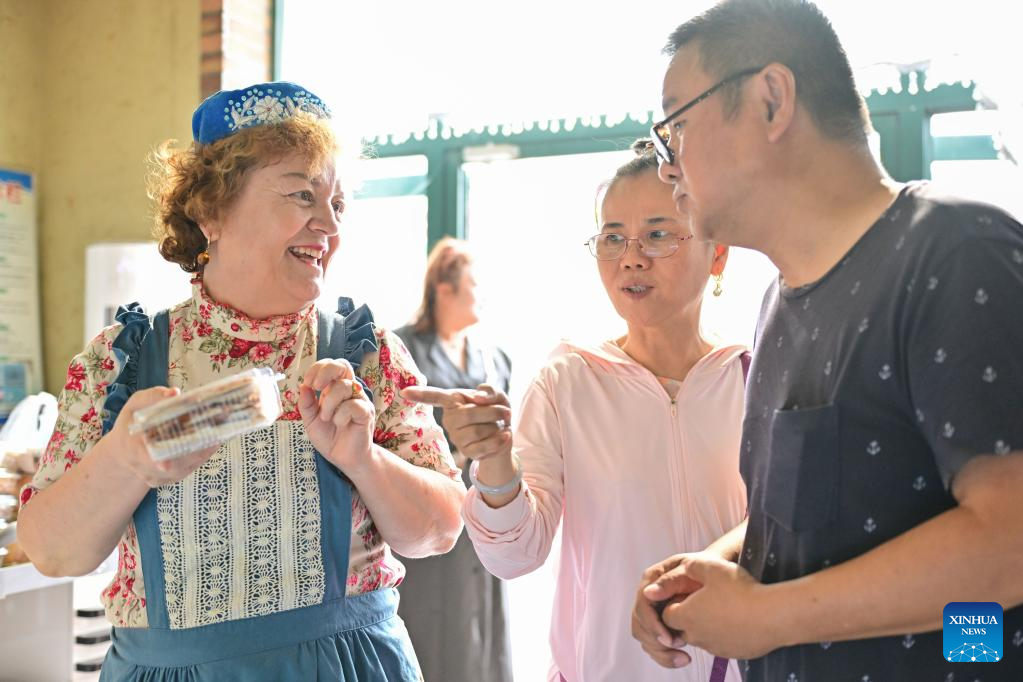
Zaitunna (L) talks about traditional Tatar pastries with customers at her retail store in Tacheng City, northwest China's Xinjiang Uygur Autonomous Region, July 24, 2024. Zaitunna, an ethnic Tatar woman living in Tacheng City of Xinjiang, is a representative inheritor of Saban Festival of Tatar ethnic group, which is one of the national intangible cultural heritages. She is also famous in the city for her expertise in making traditional Tatar pastries.
Over the years, Zaitunna and her husband have been committed to the inheritance and promotion of Tatar ethnic culture. They used their old family house built in 1915 to establish the first family museum of Tatar ethnic culture in Tacheng City, displaying a collection of more than 500 pieces of old objects full of Tatar characteristics, which carry the life memories of the family for several generations. Today, their family museum attracts visitors from all over the country, and the Tatar pastries made by Zaitunna are also sold nationwide.
In recent years, Tacheng City has accelerated the exploitation, protection and inheritance of folk culture. The folk customs of Tacheng city have become a major feature in promoting local tourism, attracting tourists from all over the world. At present, there are 14 family museums in the city, receiving around 100,000 visitors a year. (Xinhua/Ding Lei)
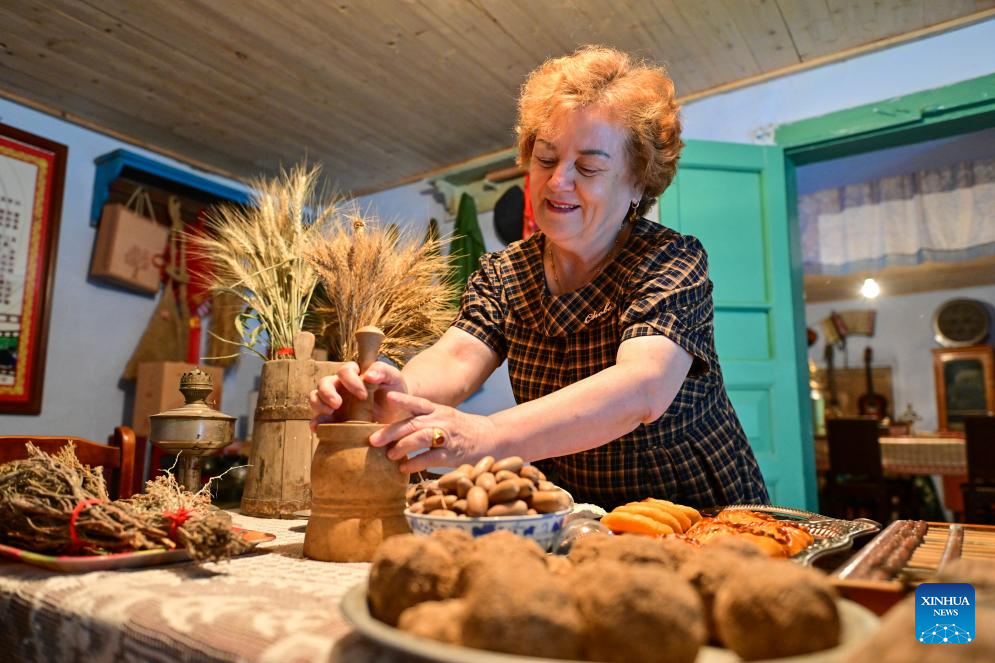
Zaitunna arranges the items at her family museum of Tatar ethnic culture in Tacheng City, northwest China's Xinjiang Uygur Autonomous Region, July 24, 2024. Zaitunna, an ethnic Tatar woman living in Tacheng City of Xinjiang, is a representative inheritor of Saban Festival of Tatar ethnic group, which is one of the national intangible cultural heritages. She is also famous in the city for her expertise in making traditional Tatar pastries.
Over the years, Zaitunna and her husband have been committed to the inheritance and promotion of Tatar ethnic culture. They used their old family house built in 1915 to establish the first family museum of Tatar ethnic culture in Tacheng City, displaying a collection of more than 500 pieces of old objects full of Tatar characteristics, which carry the life memories of the family for several generations. Today, their family museum attracts visitors from all over the country, and the Tatar pastries made by Zaitunna are also sold nationwide.
In recent years, Tacheng City has accelerated the exploitation, protection and inheritance of folk culture. The folk customs of Tacheng city have become a major feature in promoting local tourism, attracting tourists from all over the world. At present, there are 14 family museums in the city, receiving around 100,000 visitors a year. (Xinhua/Ding Lei)
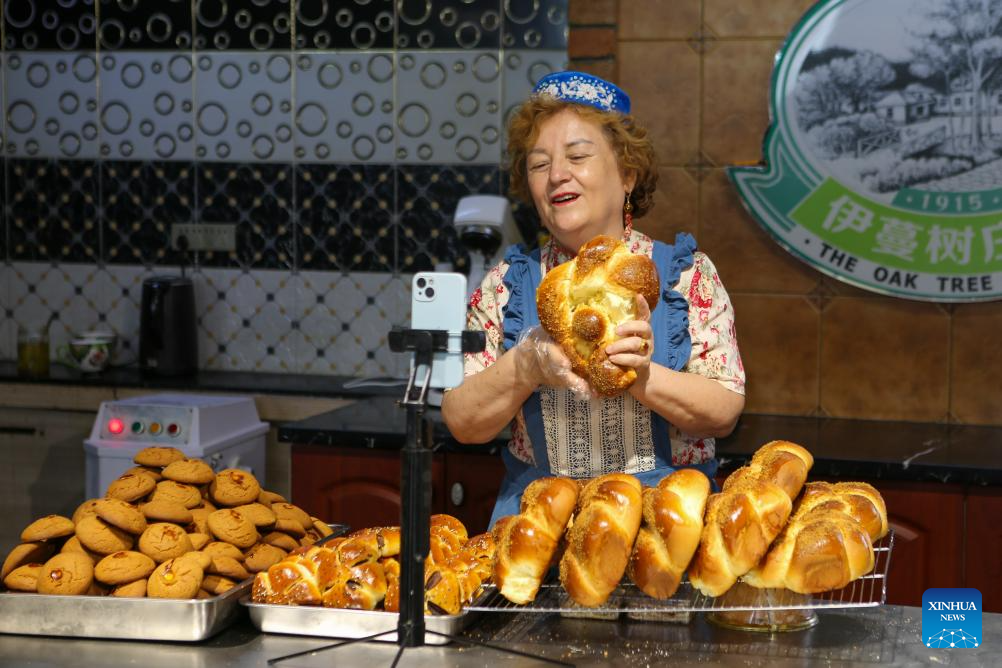
Zaitunna promotes traditional Tatar pastries via livestreaming at her retail store in Tacheng City, northwest China's Xinjiang Uygur Autonomous Region, July 24, 2024. Zaitunna, an ethnic Tatar woman living in Tacheng City of Xinjiang, is a representative inheritor of Saban Festival of Tatar ethnic group, which is one of the national intangible cultural heritages. She is also famous in the city for her expertise in making traditional Tatar pastries.
Over the years, Zaitunna and her husband have been committed to the inheritance and promotion of Tatar ethnic culture. They used their old family house built in 1915 to establish the first family museum of Tatar ethnic culture in Tacheng City, displaying a collection of more than 500 pieces of old objects full of Tatar characteristics, which carry the life memories of the family for several generations. Today, their family museum attracts visitors from all over the country, and the Tatar pastries made by Zaitunna are also sold nationwide.
In recent years, Tacheng City has accelerated the exploitation, protection and inheritance of folk culture. The folk customs of Tacheng city have become a major feature in promoting local tourism, attracting tourists from all over the world. At present, there are 14 family museums in the city, receiving around 100,000 visitors a year. (Xinhua/Lin Liping)
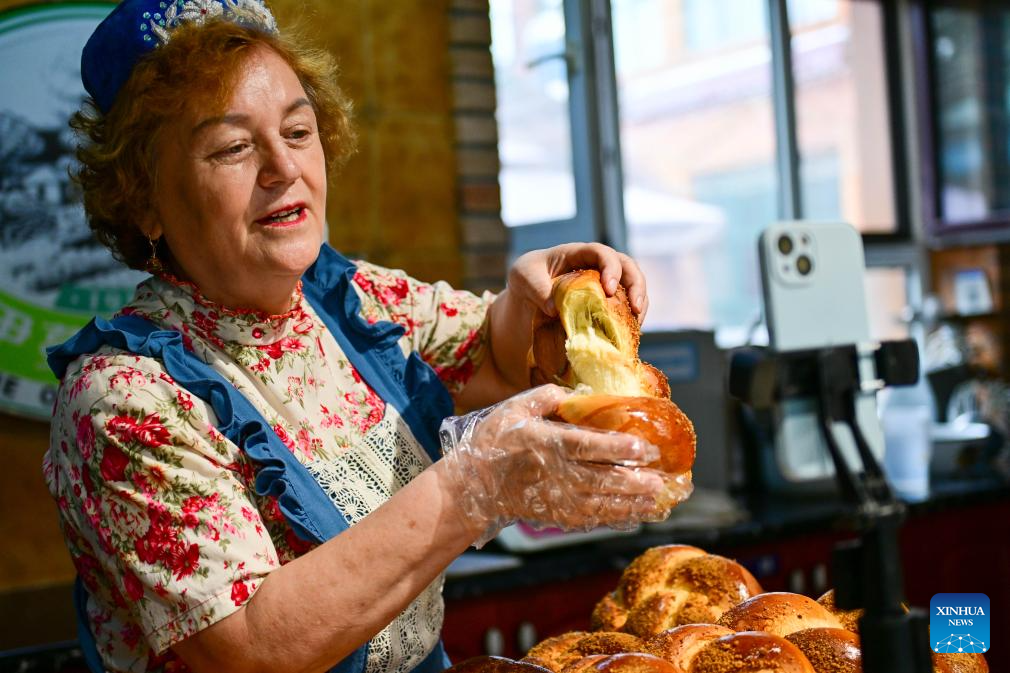
Zaitunna promotes traditional Tatar pastries via livestreaming at her retail store in Tacheng City, northwest China's Xinjiang Uygur Autonomous Region, July 24, 2024. Zaitunna, an ethnic Tatar woman living in Tacheng City of Xinjiang, is a representative inheritor of Saban Festival of Tatar ethnic group, which is one of the national intangible cultural heritages. She is also famous in the city for her expertise in making traditional Tatar pastries.
Over the years, Zaitunna and her husband have been committed to the inheritance and promotion of Tatar ethnic culture. They used their old family house built in 1915 to establish the first family museum of Tatar ethnic culture in Tacheng City, displaying a collection of more than 500 pieces of old objects full of Tatar characteristics, which carry the life memories of the family for several generations. Today, their family museum attracts visitors from all over the country, and the Tatar pastries made by Zaitunna are also sold nationwide.
In recent years, Tacheng City has accelerated the exploitation, protection and inheritance of folk culture. The folk customs of Tacheng city have become a major feature in promoting local tourism, attracting tourists from all over the world. At present, there are 14 family museums in the city, receiving around 100,000 visitors a year. (Xinhua/Ding Lei)
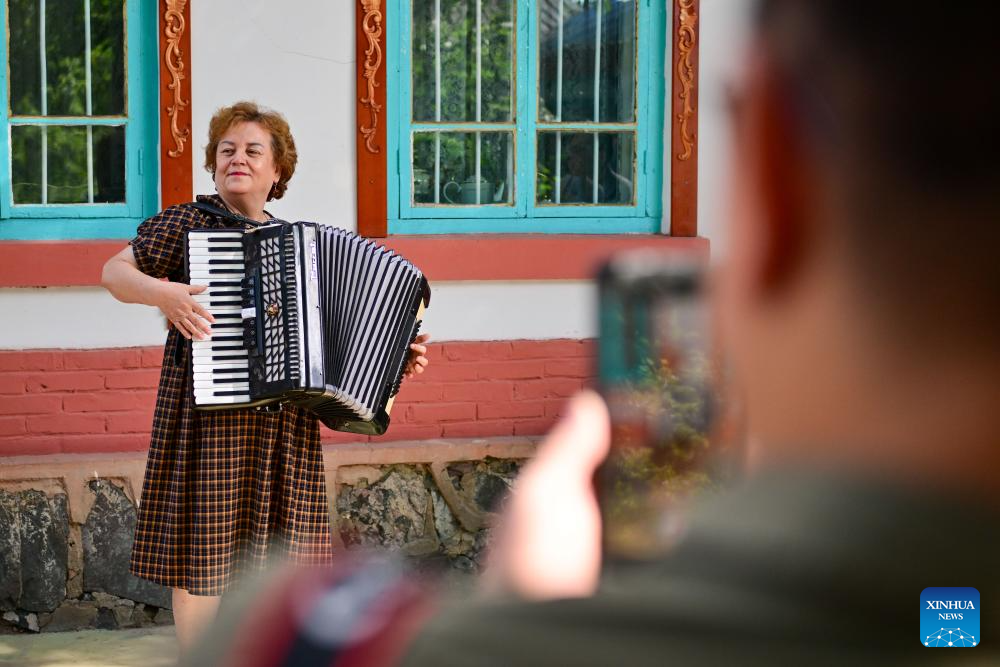
Zaitunna plays the accordion at her family museum of Tatar ethnic culture in Tacheng City, northwest China's Xinjiang Uygur Autonomous Region, July 24, 2024. Zaitunna, an ethnic Tatar woman living in Tacheng City of Xinjiang, is a representative inheritor of Saban Festival of Tatar ethnic group, which is one of the national intangible cultural heritages. She is also famous in the city for her expertise in making traditional Tatar pastries.
Over the years, Zaitunna and her husband have been committed to the inheritance and promotion of Tatar ethnic culture. They used their old family house built in 1915 to establish the first family museum of Tatar ethnic culture in Tacheng City, displaying a collection of more than 500 pieces of old objects full of Tatar characteristics, which carry the life memories of the family for several generations. Today, their family museum attracts visitors from all over the country, and the Tatar pastries made by Zaitunna are also sold nationwide.
In recent years, Tacheng City has accelerated the exploitation, protection and inheritance of folk culture. The folk customs of Tacheng city have become a major feature in promoting local tourism, attracting tourists from all over the world. At present, there are 14 family museums in the city, receiving around 100,000 visitors a year. (Xinhua/Ding Lei)
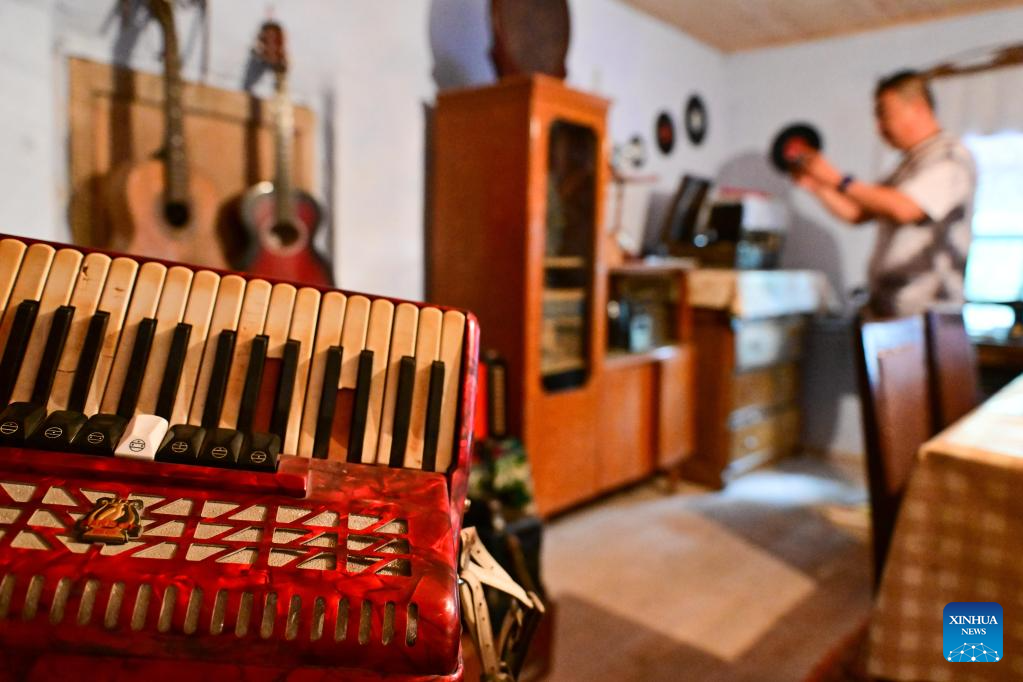
A visitor takes photos at Zaitunna's family museum of Tatar ethnic culture in Tacheng City, northwest China's Xinjiang Uygur Autonomous Region, July 24, 2024. Zaitunna, an ethnic Tatar woman living in Tacheng City of Xinjiang, is a representative inheritor of Saban Festival of Tatar ethnic group, which is one of the national intangible cultural heritages. She is also famous in the city for her expertise in making traditional Tatar pastries.
Over the years, Zaitunna and her husband have been committed to the inheritance and promotion of Tatar ethnic culture. They used their old family house built in 1915 to establish the first family museum of Tatar ethnic culture in Tacheng City, displaying a collection of more than 500 pieces of old objects full of Tatar characteristics, which carry the life memories of the family for several generations. Today, their family museum attracts visitors from all over the country, and the Tatar pastries made by Zaitunna are also sold nationwide.
In recent years, Tacheng City has accelerated the exploitation, protection and inheritance of folk culture. The folk customs of Tacheng city have become a major feature in promoting local tourism, attracting tourists from all over the world. At present, there are 14 family museums in the city, receiving around 100,000 visitors a year. (Xinhua/Ding Lei)
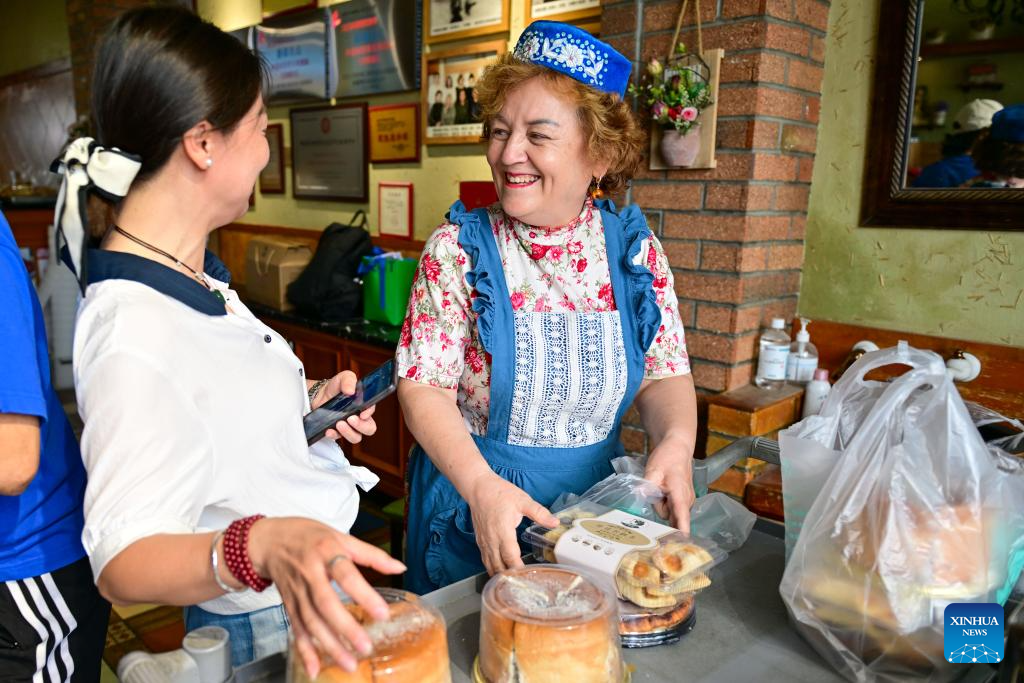
Zaitunna (R) and a customer communicate at her retail store of traditional Tatar pastries in Tacheng City, northwest China's Xinjiang Uygur Autonomous Region, July 24, 2024. Zaitunna, an ethnic Tatar woman living in Tacheng City of Xinjiang, is a representative inheritor of Saban Festival of Tatar ethnic group, which is one of the national intangible cultural heritages. She is also famous in the city for her expertise in making traditional Tatar pastries.
Over the years, Zaitunna and her husband have been committed to the inheritance and promotion of Tatar ethnic culture. They used their old family house built in 1915 to establish the first family museum of Tatar ethnic culture in Tacheng City, displaying a collection of more than 500 pieces of old objects full of Tatar characteristics, which carry the life memories of the family for several generations. Today, their family museum attracts visitors from all over the country, and the Tatar pastries made by Zaitunna are also sold nationwide.
In recent years, Tacheng City has accelerated the exploitation, protection and inheritance of folk culture. The folk customs of Tacheng city have become a major feature in promoting local tourism, attracting tourists from all over the world. At present, there are 14 family museums in the city, receiving around 100,000 visitors a year. (Xinhua/Ding Lei)
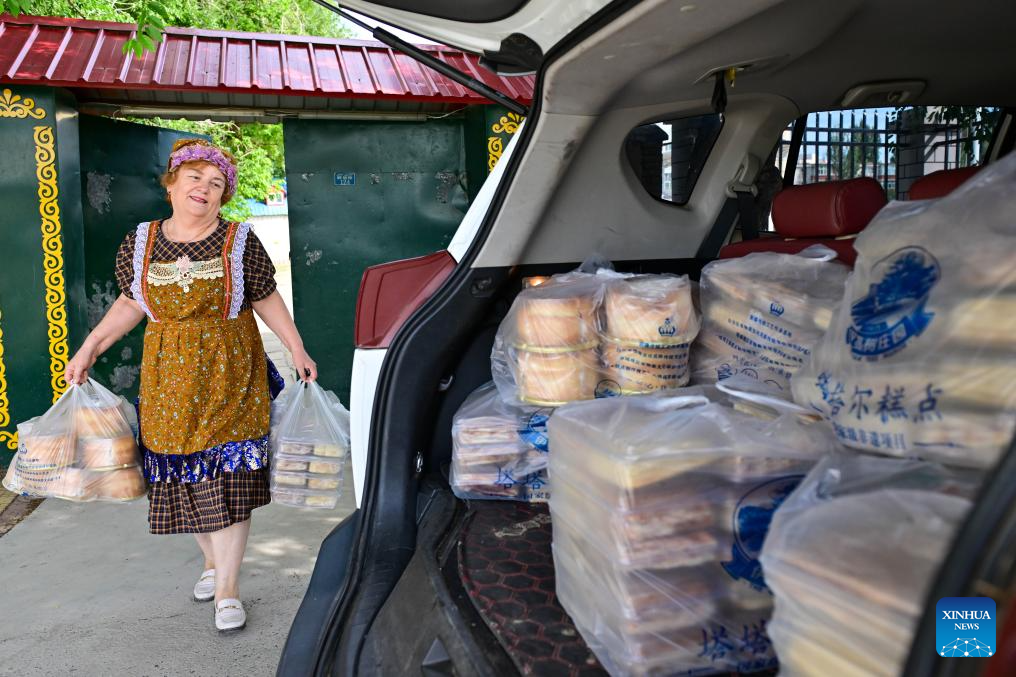
Zaitunna puts traditional Tatar pastries in a car in Tacheng City, northwest China's Xinjiang Uygur Autonomous Region, July 24, 2024. Zaitunna, an ethnic Tatar woman living in Tacheng City of Xinjiang, is a representative inheritor of Saban Festival of Tatar ethnic group, which is one of the national intangible cultural heritages. She is also famous in the city for her expertise in making traditional Tatar pastries.
Over the years, Zaitunna and her husband have been committed to the inheritance and promotion of Tatar ethnic culture. They used their old family house built in 1915 to establish the first family museum of Tatar ethnic culture in Tacheng City, displaying a collection of more than 500 pieces of old objects full of Tatar characteristics, which carry the life memories of the family for several generations. Today, their family museum attracts visitors from all over the country, and the Tatar pastries made by Zaitunna are also sold nationwide.
In recent years, Tacheng City has accelerated the exploitation, protection and inheritance of folk culture. The folk customs of Tacheng city have become a major feature in promoting local tourism, attracting tourists from all over the world. At present, there are 14 family museums in the city, receiving around 100,000 visitors a year. (Xinhua/Ding Lei)
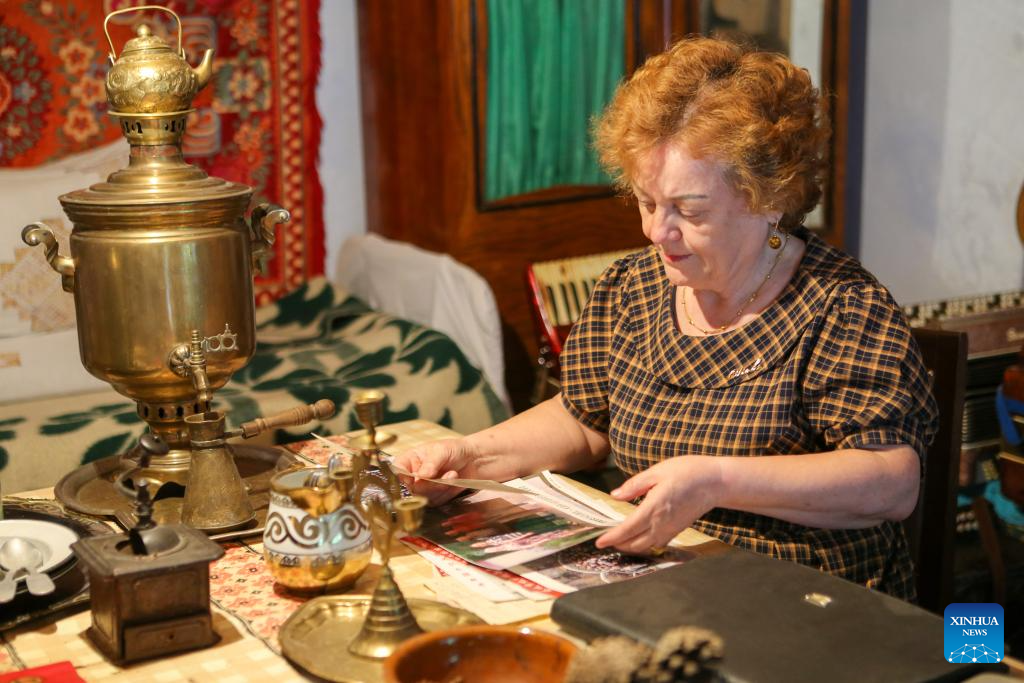
Zaitunna looks at old photos at her family museum of Tatar ethnic culture in Tacheng City, northwest China's Xinjiang Uygur Autonomous Region, July 24, 2024. Zaitunna, an ethnic Tatar woman living in Tacheng City of Xinjiang, is a representative inheritor of Saban Festival of Tatar ethnic group, which is one of the national intangible cultural heritages. She is also famous in the city for her expertise in making traditional Tatar pastries.
Over the years, Zaitunna and her husband have been committed to the inheritance and promotion of Tatar ethnic culture. They used their old family house built in 1915 to establish the first family museum of Tatar ethnic culture in Tacheng City, displaying a collection of more than 500 pieces of old objects full of Tatar characteristics, which carry the life memories of the family for several generations. Today, their family museum attracts visitors from all over the country, and the Tatar pastries made by Zaitunna are also sold nationwide.
In recent years, Tacheng City has accelerated the exploitation, protection and inheritance of folk culture. The folk customs of Tacheng city have become a major feature in promoting local tourism, attracting tourists from all over the world. At present, there are 14 family museums in the city, receiving around 100,000 visitors a year. (Xinhua/Lin Liping)
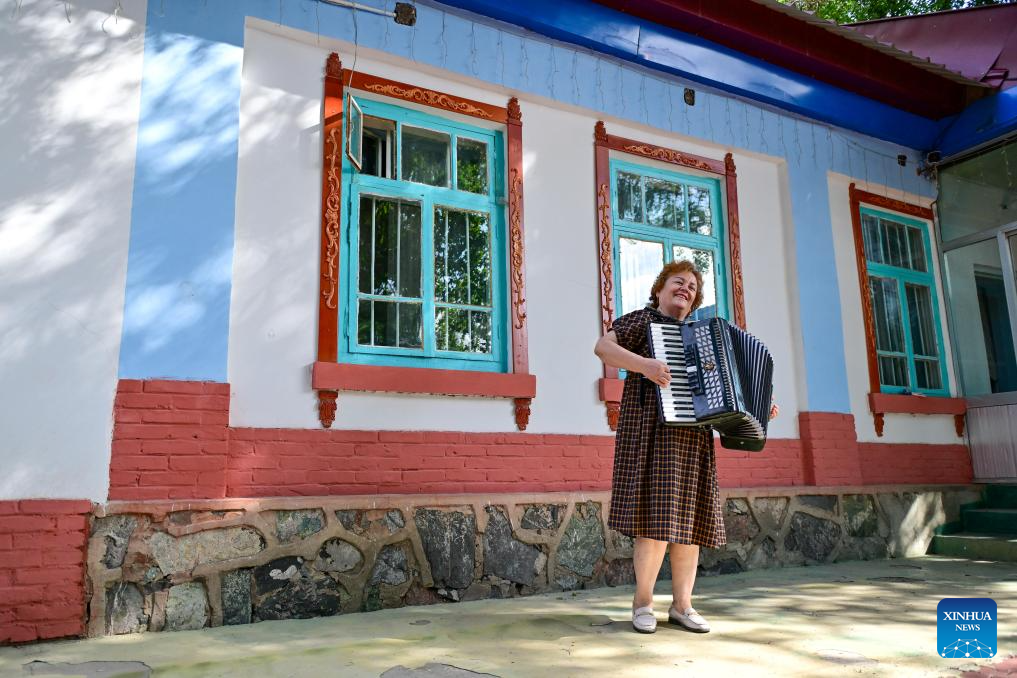
Zaitunna plays the accordion at her family museum of Tatar ethnic culture in Tacheng City, northwest China's Xinjiang Uygur Autonomous Region, July 24, 2024. Zaitunna, an ethnic Tatar woman living in Tacheng City of Xinjiang, is a representative inheritor of Saban Festival of Tatar ethnic group, which is one of the national intangible cultural heritages. She is also famous in the city for her expertise in making traditional Tatar pastries.
Over the years, Zaitunna and her husband have been committed to the inheritance and promotion of Tatar ethnic culture. They used their old family house built in 1915 to establish the first family museum of Tatar ethnic culture in Tacheng City, displaying a collection of more than 500 pieces of old objects full of Tatar characteristics, which carry the life memories of the family for several generations. Today, their family museum attracts visitors from all over the country, and the Tatar pastries made by Zaitunna are also sold nationwide.
In recent years, Tacheng City has accelerated the exploitation, protection and inheritance of folk culture. The folk customs of Tacheng city have become a major feature in promoting local tourism, attracting tourists from all over the world. At present, there are 14 family museums in the city, receiving around 100,000 visitors a year. (Xinhua/Ding Lei)
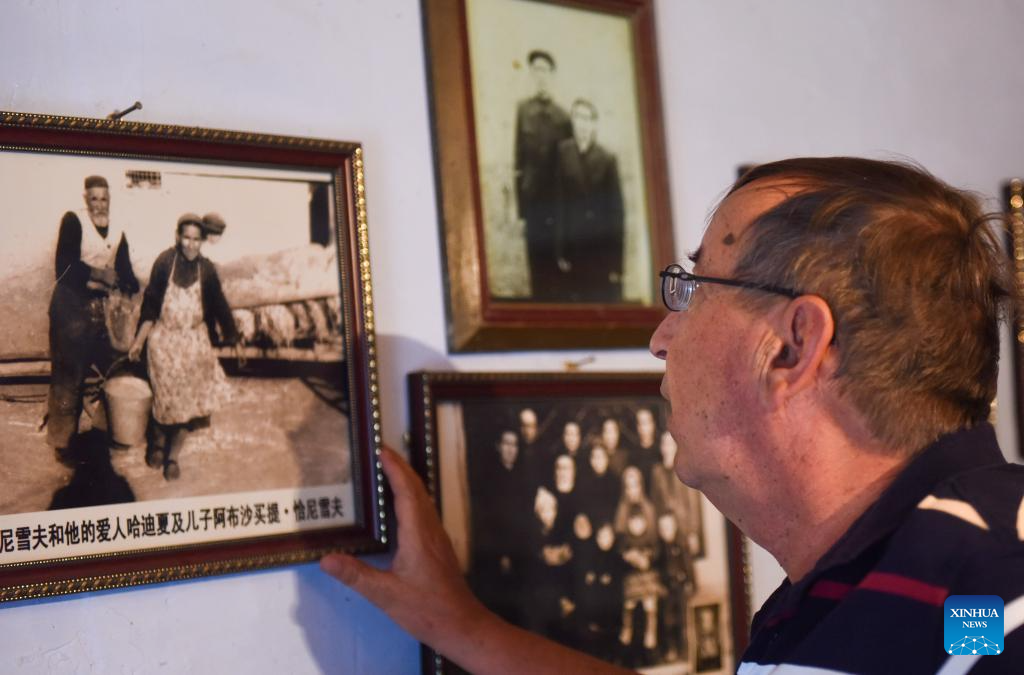
Zaitunna's husband looks at old photos at the family museum of Tatar ethnic culture in Tacheng City, northwest China's Xinjiang Uygur Autonomous Region, July 24, 2024. Zaitunna, an ethnic Tatar woman living in Tacheng City of Xinjiang, is a representative inheritor of Saban Festival of Tatar ethnic group, which is one of the national intangible cultural heritages. She is also famous in the city for her expertise in making traditional Tatar pastries.
Over the years, Zaitunna and her husband have been committed to the inheritance and promotion of Tatar ethnic culture. They used their old family house built in 1915 to establish the first family museum of Tatar ethnic culture in Tacheng City, displaying a collection of more than 500 pieces of old objects full of Tatar characteristics, which carry the life memories of the family for several generations. Today, their family museum attracts visitors from all over the country, and the Tatar pastries made by Zaitunna are also sold nationwide.
In recent years, Tacheng City has accelerated the exploitation, protection and inheritance of folk culture. The folk customs of Tacheng city have become a major feature in promoting local tourism, attracting tourists from all over the world. At present, there are 14 family museums in the city, receiving around 100,000 visitors a year. (Xinhua/Huang Xiaoyong)



